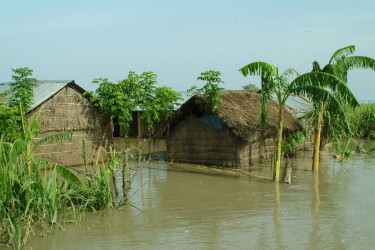Talk about a rollercoaster of a start to a new job... I thought coming back from Afghanistan would mean a period of relative relaxation. How wrong I was! Climate change is where it's at.

My first couple of months have been leading up to this week, when I find myself in the international corridors of development thinking and funding that are the World Bank. You know the huge conference rooms you see in films or news pieces, where there are country names in front of attendees rather than name tags, and where one end of the table is so far from the other that microphones are an essential prop? That's where I am right now - sitting at the back, blogging, and giving the odd bit of advice to my boss who is the UK lead on the programme currently under discussion. Soon we'll be swapping seats and it'll be my turn to stand my country name on end each time I'm seeking the Chair's attention.
I'm now working in DFID's Climate and Environment Group, coordinating the UK's £800 million input to the Climate Investment Funds (CIFs) which is shared equally between DFID and the Department for Energy and Climate Change. The CIFs are a multi-donor, World Bank-administered set of funds and programmes to assist developing countries to build low carbon approaches and climate resilience into their national development plans. On current exchange rates, some $6.4 billion has been pledged to the CIFs by donor countries.
This might all sound very processy and like the kind of thing that happens in the corridors of power while our real job of helping the world's poor is many miles away. But sitting here, it occurs to me that the links between this room and that ‘real' job are tangible. For a start, one of the frequent criticisms of the World Bank and the other international financial institutions is that developing countries are not adequately represented in governance structures and decision making. Not so in the CIFs. Every committee within the CIFs has equal representation of donor and recipient countries, meaning that the voices of poor countries' governments are heard in every discussion. Non-governmental organisations (NGOs), the private sector and indigenous people's groups are also involved, and can propose agenda items or request the floor.
This meeting is also a remarkable example of how to make rapid decisions on very large sums of money in order to catalyse speedy action. So that, for example, a Bangladeshi farmer's land can be protected against rising sea levels. Or a poor community in Tanzania can have electricity for the first time, perhaps ensuring that crop processing can be done locally, or reducing their expenditure on imported diesel. Rapid action also means that the successes of the CIFs - and anything that doesn't work so well - can help the international community to learn lessons ahead of a critical set of climate change negotiations that take place in Copenhagen at the end of 2009.
So from the sharp end in Helmand, to the conference room in Washington, D.C., I feel I'm working to the same ends. I'll update the blog as the week goes on and the discussions ramp up - still to come is the agreement of a new programme on scaling up renewable energy in low income countries, an update on the eight pilot countries that have accepted an offer to assist them integrate climate resilience into their development plans, and thinking about how we manage a major lesson learning event ahead of Copenhagen to ensure we're drawing lessons from the CIFs.
In the meantime, I need to join the legions of staffers working on Capitol Hill as they take their daily run along the Mall and switch off from the high-powered discussions of the day...


Recent Comments